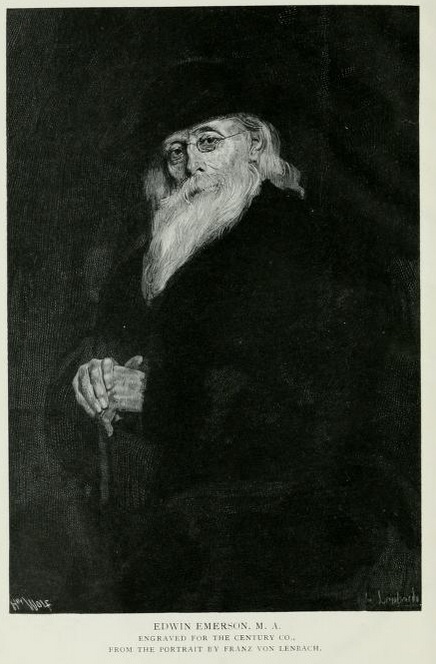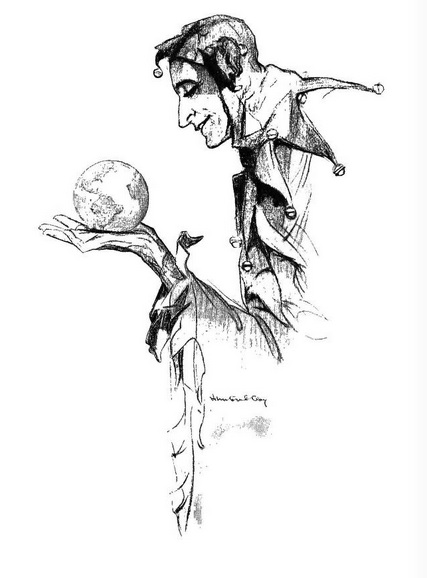TECHNICAL NOTE: The great majority of the links below are to
scanned antique books at the Internet Archive, most of them
anthologies. Poems frequently run for several pages; when coming
to the apparent end of a poem, turn the page to make sure!
One of Iceland's greatest poets.
Eliot, George:
Hamlet and friends discuss philosophy, science, and life.
Elliott, Ebenezer: "The Cornlaw Rhymer".
For Henry Bell, unrewarded steamship pioneer.
Lines Written After Seeing the Plates of
Audubon's Birds of America
Steam at Sheffield
The Romantic poet should awaken to the wonders of the Industrial Age.
Verses on the Opening of the Sheffield and Rotherham Railway
On the failure of social justice to keep pace with technology.
Emerson, Edwin, Sr.:
Not Ralph Waldo. Edwin Emerson Sr.,
besides being a poet, lawyer, and diplomat, was
an American semi-secret agent in Bismarck's Germany. (His son Edwin Jr.,
who lived to be 90, was an even more
peculiar figure: journalist, Rough Rider, American and probably German spy,
author of a book on comets,
and in old age, unfortunately, an apologist for the Nazis.)
Standard Romantic view of Nature.
Evolution A laborious attempt at a joke.
The Monk of the Tyrol Eight-page anti-religious
geology poem.
To the Star Sirius
One of the many Long Nineteenth Century poems arguing that
scientific discovery actually adds to the wonder of the world.
The Stone Age Probably meant to be read with the poem
"Progress", immediately following it in the book.
Sublimities "My hand-maid, science, has provided
me with power to probe the deep immensity ... "
Time and Space Could time exist without matter?
Emerson, Ralph Waldo:
Ten scholars (two of them naturalists collecting specimens) travel across
upstate New York as the news arrives of the Transatlantic Cable.
Alphonso of Castile
Who allegedly thought that God should have asked him for advice.
Blight
Science is valuable only in a Romantic context.
Botanist: A Quatrain
Botany for Emerson was the symbol of everything wrong with modern
science.
Circles
Emerson was fascinated by circles.
Initial, Daemonic, and Celestial Love
Monadnoc
A teleological vision of the universe.
Musketaquid
Song of the Romantic scientist.
Solution
One theme of this poem is that the ideal scientist is a poet (e.g. Swedenborg
or Goethe). Perhaps the title refers to an earlier poem,
"The Problem",
criticising the Church Fathers.
Song of Nature
The Sphinx
An epistemology poem.
Uriel
Circles are superior to lines.
Wealth
On matter, evolution, and technology.
Evanson, R. T.: A physician. Science explains phenomena that would once have inspired superstitious terror. Inspired by an actual meteor shower in 1866.
Field, Charles Kellogg:
Fossil bird never dreamed he would someday contribute to education.
The Ladye of the Lab
Sophomoric "comic" poem about the vivisection of a dog by a female
student.
Field, Eugene:
Medical satire.
Fitzpatrick, Patrick Vincent:
From Thaumaturgus. See also the next poem, 'Del Volo'.
Kepler:
From Thaumaturgus. The narrator is travelling through space.
Fisher, Fred: American popular song-writer.
- Come, Josephine, In My Flying Machine
Extremely popular in the 1910s.
Foley, J. W.:
Author of folksy newspaper poems, often about
the American West.
Mild anti-technology (or really anti-bad design) satire.
Scientific Proof
Actually more "mathematical proof". Although not terribly funny, it contains
some nice phrases (e.g. "the real square root of North")
and is a memento of the several centuries when polar exploration
was closely linked to mathematical astronomy.
The Unrest of Knowledge
Comic version of the (very real) depressing effect that pessimistic
cosmological speculations had on Late Victorian thought.
Forbes, George: Astronomer and novelist.
- Lament of the Twenty-One Coefficients
Unfortunately, we are unable to find the full text of this
humourous poem, described in
Science 7, No. 152, p.9 [1886].
Forster, Thomas:
-
Philosophical Breakfast Song "Come hasten to
breakfast at Trinity College // For Herschel and Forster and
Babbage and all // Are bringing their porridge //
Their wit and their knowledge // From each learned college //
And each learned hall."
Frankau, Gilbert:
-
Eyes in the Air
Aerial reconnaissance in the Great War. Part of a longer war poem,
A Song of the Guns.
-
Signals
Part of a longer war poem,
A Song of the Guns.
-
The Song of the Crashing Wing
Mythologises aerial warfare. Part of a longer war poem,
The Judgement of Valhalla.
-
A Song of the Guns
Written during the Battle of Loos. Conveys the new, mechanised
nature of warfare as experienced by soldiers in 1915.
Freneau, Philip Morin: Poet of the American Revolution.
A satire against scientific astronomy. Interestingly,
the eponymous character is much worried about the
sources of the sun's energy and
their eventual exhaustion.
American Antiquity Advocates the
view that life (including humans) has independently originated many times
by spontaneous generation; American wildlife and American Indians did not
"from bleak Kamschatka come ... No! --- from this dust, this common
dust, they drew their different forms." (The poem seems to be unfinished.)
Columbus to Ferdinand Columbus's research proposal to the
royal funding agency.
On the Death of Dr. Benjamin Franklin A serious eulogy, immediately
followed by the satirical "Epistle from Dr. Franklin (deceased) to his poetical
Panegyrists".
To Mr. Blanchard "... the celebrated Æronaut: on his
ascent in a Balloon from the jail-yard in
Philadelphia: 1793."
To a Persecuted Philosopher Probably meaning Joseph
Priestley.
The Progress of Balloons Comic, but remarkably prophetic.
Gerberding, Elizabeth:
-
The Canal
"Hail to the mighty thought that cleft a continent in twain!"
Gilder, Richard Watson:
Gillies, Capt. Robert C.:
-
Love Mathematical He was constant
but arbitrary, she was independent
and variable, will they ever integrate? You get the idea.
Goethe:
Gosse, Edmund:
Grabiel, Zephaniah O.:
-
Nature Mainly a religious poem about Creation week,
with some quasi-scientific material. Stiffly written and
72 pages long.
Guiterman, Arthur: American humourist.
A joke.
A Pure Mathematician A bit stereotypical.
The Quest of the Car Pseudo-folkloric ballad
about buying an automobile.
Rudyard Kipling Not quite the image of Kipling
most people have:
"I will chant in Lowland Dutch / Of Quaternions
and such, / And the boundless Fourth Dimension shall delight
to honour ME!"
Strictly Germ-Proof The Antiseptic Baby and the Prophylactic Pup
meet a rabbit, and are horrified.
Tea with a Dinosaur "Rise, oh, rise and smash the crockery!"
A Tract for Autos Parody of inspirational verse for children,
but addressed to motor-cars.


